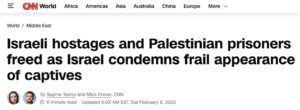This time, there was no way for the masked terrorists—green headbands wrapped around their anonymous faces—even to attempt hiding the hideous abuses they had inflicted on their captives. No showy stage parade, no gun-wielding militants forcing their emaciated hostages to recite scripted words before a rapturous crowd, could distract the world from what was plainly visible: three Israeli civilians, violently abducted from their homes, now bearing the marks of 16 months of unspeakable torture.
Every one of those 491 days spent underground, in darkness, in a space barely big enough to stand, was etched into their hollowed cheeks, their skeletal frames causing some to evoke images of survivors from Nazi concentration camps.
As the families of Eli Sharabi, Or Levy, and Ohad Ben Ami watched live footage of their release, the initial flood of relief quickly gave way to shock and agony. Their loved ones were unrecognizable. It was a gut-wrenching sight.
We have criticized the media’s coverage of these hostage releases from the very beginning. Sometimes, it’s sheer sloppiness—misleading terminology, factual errors, like outlets falsely referring to kidnapped Israeli civilians as “soldiers.” Other times, it’s far more insidious: a grotesque imbalance, an eagerness to humanize Palestinian prisoners—most of them convicted of violent, deadly attacks against Israelis—while downplaying the suffering of Israeli hostages.
But even by these dismal standards, Saturday’s coverage of the hostage-prisoner exchange was a new low.
And a few media organizations, in particular, deserve special condemnation: the BBC, CNN, and The Guardian.
The coverage of Saturday’s events does not deserve to be classed as news. The reporters who wrote these pieces and the editors who approved them are not journalists in any meaningful sense of the word. And their readers and viewers should know the sheer contempt these media organizations have for them.
The BBC’s reporting marked a new nadir for the taxpayer-funded British broadcaster, with its live news coverage stating there were “concerns over appearance of hostages on both sides.”
“Concerns over appearance of hostages on both sides” — @BBCNews.
There are no “both sides” here.
What a disgusting false moral equivalence between actual Israeli hostages held by Hamas & Palestinian prisoners jailed for terror offenses.
It’s the BBC. Why aren’t we surprised? pic.twitter.com/FbCUZTk7mC
— HonestReporting (@HonestReporting) February 9, 2025
Yes, the publicly funded BBC referred to convicted terrorists, imprisoned for murder, as “hostages,” equating them with innocent civilians kidnapped by Hamas—a UK-proscribed terror group. And as for those “concerns over appearances”? That was how the BBC summarized the horror of seeing three innocent men tortured and starved for over a year, likening them to Palestinian terrorists who are fed, housed, and in no danger of being dragged from their cells in the middle of the night to be executed.
The BBC’s website coverage was no better. For hours, its live news homepage featured a celebratory image of Palestinian prisoners embracing their families, while the release of the emaciated hostages was relegated to the second half of the headline—deemed unworthy of the lead photo.
This wasn’t sloppy journalism. This was an editorial choice.
The @BBCWorld homepage. The haunting images of starved Israeli hostages? Nowhere to be seen.
But a front-page moment for convicted murderers embracing their families.
Sickening. pic.twitter.com/H6hz7brzk4
— HonestReporting (@HonestReporting) February 8, 2025
CNN’s coverage of the hostage handover also led with grotesque attempts to equate hostages and prisoners, with its lead story claiming that “many of [the prisoners] appeared emaciated and in poor health”—a statement that contradicts even the Palestinians’ own unsubstantiated claim that seven of the 183 prisoners were “transferred to hospital” upon release.


Meanwhile, The Guardian described the Palestinian prisoners and the starved Israeli hostages as “gaunt captives” in a headline that amounts to journalistic depravity.
The @guardian’s latest disgrace: equating Israeli hostages starved in Hamas captivity with convicted Palestinian terrorists who were never deprived of food.
This is journalistic moral rot. pic.twitter.com/esRi2g4nUe
— HonestReporting (@HonestReporting) February 9, 2025
And yet, these are just three of the worst offenders—singled out because their coverage so clearly exposed just how deep the media rot has set. Western media outlets are quite literally adopting the language of Islamist terror groups, describing Hamas and Islamic Jihad operatives as “hostages” and “captives,” making excuses, and acting as apologists for the same terrorists who starved these three innocent men after kidnapping them. They then have the audacity to draw morally repugnant comparisons to legitimately imprisoned criminals.
Too many journalists looked at images that echoed the Nazi Holocaust—and seemed entirely unaffected. Instead of doing their jobs and reporting the plain truth, they reached for language that softened the horror, describing the hostages as merely “gaunt” and “weakened,” “pale” and “thin”—glossing over their final torturous humiliation on stage.
The three released Israeli hostages weren’t just “gaunt” as @Reuters claims. It’s far worse and shouldn’t have shocked only Israelis.
And what’s also worse? It wasn’t “dozens” of Palestinians freed. It was 183, including 18 serving life sentences for deadly attacks on Israelis. pic.twitter.com/p1GbaZhpL5
— HonestReporting (@HonestReporting) February 9, 2025
On Saturday evening, Israel’s Government Press Office issued a statement condemning the media’s attempts to “establish a comparison and/or symmetry” between the hostages and the legitimately imprisoned Palestinian terrorists, calling it a narrative that “runs contrary to every ethical standard of journalism.”
The three outlets singled out here—the BBC, The Guardian, and CNN—showed a total disregard for journalistic standards and, worse, for basic human decency. Their coverage wasn’t just biased. It was a moral disgrace.
Liked this article? Follow HonestReporting on Twitter, Facebook, Instagram and TikTok to see even more posts and videos debunking news bias and smears, as well as other content explaining what’s really going on in Israel and the region.
Credit: Eyad Baba / AFP; courtesy



